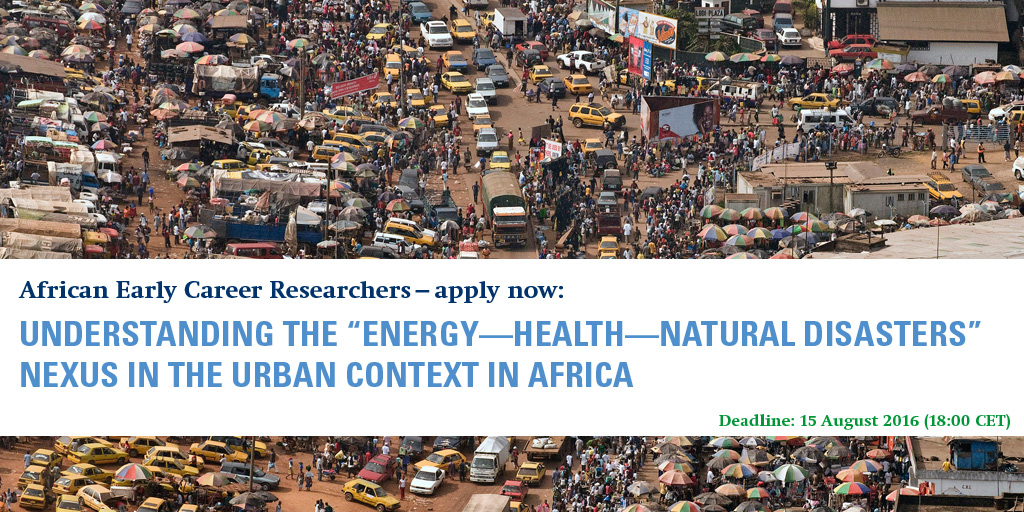Johannesburg, November 29, 2017 - Nigeria has pledged to restore 4 million hectares of degraded land by 2030 as part of the AFR100 Initiative and Bonn Challenge, signalling the continuing drive across Africa to bring back productivity to its land.
Forests and Forest-based Products for a Greener Future
Land tenure, forest use conflicts and benefit sharing arrangements are key issues to be addressed in African forest policy. State-of-the-art knowledge on these issues across Sub-Saharan Africa will assist in formulation and implementation of appropriate policies.
By 2030, 24 African countries pledge to restore 100 million hectares of land. To some, this might sound like utopia. For us, it is reality, and *it.is.happening*!
Read more about this amazing initiative:
By 2030, 24 African countries pledge to restore 100 million hectares of land. To some, this might sound like utopia. For us, it is reality, and *it.is.happening* !
Read more about this amazing initiative:
CALL FOR ABSTRACTS
"African forest-related policy and politics"
24-27 September 2018 in Yaoundé, Cameroon
1st announcement
CALL FOR ABSTRACTS - SAVE THE DATE
Ce livre nous emmène au coeur des zones de forêts denses et sahéliennes de l'Afrique centrale, un écosystème précieux et essentiel à la vie quotidienne de ses habitants, représentant l'un des trois principaux ensembles boisés tropicaux de la planète.
The International Forestry Students' Association (IFSA) will be hosting the annual Northern Africa Regional Meeting (NARM) in Sunyani, Ghana, 21-26 May 2017.
Attachment Size Training for African students during IFSA event_Ghana_May2017.pdf 633.83 KB
Attachment Size Symposium Reg Form 2017F.doc 1.41 MB SymposiumAbstractform2017.doc 1.44 MB
The 12th Session of the United Nations Forum on Forests will be held in New York from 1-5 May 2017. The Agenda items include the following:
IUFRO launched a new policy brief on forest landscape restoration at COFO23 World Forest Week hosted at the United Nations Food and Agriculture Organization in Rome, Italy.
The impacts of charcoal production on woodland were assessed in the Forest-Savannah Transition Zone of Ghana to facilitate policy formulation for a win-win situation for both sustainable woodland management and charcoal production.
Given the considerable current political momentum and commitment towards Forest Landscape Restoration (FLR) by global and national policy makers, there is the need to discuss and further develop approaches and mechanisms of FLR implementation on the ground.
The Rwandan Ministry of Natural Resources (MINIRENA) in cooperation with the International Union of Forest Research Organizations (IUFRO), the Food and Agriculture Organization, and Wageningen University, based on funding support by the German Federal Ministry for the Environment, Nature Conservation, Building and Nuclear Safety (BMUB) are organising an International Knowledge-Sharing Workshop on “Forest Landscape Restoration and Global Change: From Policy to Practice” in Kigali, Rwanda from 26 to 27 July, 2016.
Attachment Size AFF-HAFL Scholarship Programme Call_2015_v2.pdf 272.99 KB Application Form_FINAL.doc 79 KB
Draft ministerial declaration of the high-level segment of the eleventh sesssion of the United Nations Forum on Forests
Attachment Size ECN182015L1Rev1-N1514038-Declaration - Copy (2).pdf 193.35 KB
Draft resolution submitted by the Chair of the United Nations Forum on Forests at its eleventh session, Noel Nelson Messone (Gabon), on the basis of informal consultations
Attachment Size ECN182015L2Rev1-1507842E-Resolution - Copy (2).pdf 107.24 KB
TWAS is inviting young scientists from the developing world, as well as policymakers and diplomats with a science portfolio, to apply to attend a TWAS Science Diplomacy workshop on Sustainable Water Management to be held in Trieste from 30 November to 4 December, 2015.
IUFRO’s Special Programme for Development of Capacities (SPDC) in collaboration with the World Resources Institute is organizing a 3-day training workshop on science-policy interactions for forest and landscape restoration in conjunction with the World Forestry Congress
News
Events
Publications
Assessing differences in competitive effects among tree species in central British Columbia, Canada.
Research Highlights: We investigated the competitive interactions among three tree species (interior Douglas-fir (Pseudotsuga menziesii var. glauca (Beissn.) Franco), interior spruce (Picea glauca [Moench] Voss × Picea engelmannii Engelm.), and lodgepole pine (Pinus contorta Dougl. Ex Loud. var. latifolia Englem.)) in multi-aged stands in central British Columbia, Canada. Background and Objectives: Understanding competitive interactions among tree species in mixed-species stands is fundamental to supporting silvicultural decision-making in such stands.
This study sought to gain insight into the impact of thinning treatments on stand structure dynamics in uneven-aged interior Douglas-fir (Pseudotsuga menziesii var. glauca (Beissn.) Franco) dominated stands in central British Columbia (BC), Canada. We applied the Gini coefficient (GC) and the growth dominance coefficient (GDc) to determine how size inequality and growth dominance changed through time in both pre-commercially thinned (PCT) and unthinned stands across a moisture gradient.
Understanding the spatial patterns of trees and their interactions can reveal the ecological processes driving forest stand structure and stand development over time. We assessed temporal changes in tree spatial patterns in uneven-aged interior Douglas-fir (Pseudotsuga menziesii var. glauca (Beissn.) Franco) dominated stands in central British Columbia, Canada. Data were available on 24 plots in three blocks over 21 years, 18 of which had received pre-commercial thinning (PCT) treatments of varying intensity.
We assessed the impacts of three approaches to thinning from below with varying spatial patterns on several stand and individual tree variables for interior Douglas-fir (Pseudotsuga menziesii var. glauca (Beissn.) Franco), interior spruce (Picea glauca (Moench) Voss × Picea engelmannii Engelm.), and lodgepole pine (Pinus contorta Dougl. Ex Loud. var. latifolia Englem.) in central British Columbia, Canada.
Promoting the consumption of forest plant foods is a sustainable way of ensuring good nutrition and food security. This study assessed traditional knowledge on and use of forest plant foods in three administrative districts of Ghana and evaluated their potentials for domestication and processing. A total of 606 households were randomly selected and interviewed using enumerator-administered questionnaires.
| Attachment | Size |
|---|---|
| TK_forestplant_foods_Ghana.pdf | 1.11 MB |

